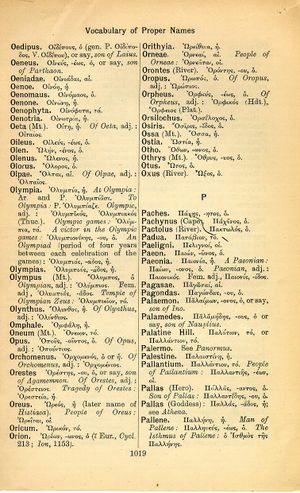Orpheus
Οὕτως ἔδειξέν μοι κύριος καὶ ἰδοὺ ἐπιγονὴ ἀκρίδων ἐρχομένη ἑωθινή, καὶ ἰδοὺ βροῦχος εἷς Γωγ ὁ βασιλεύς (Amos 7:1) → Thus the Lord showed me and look, early-morning offspring of locusts coming, and look, one locust-larva: Gog the king.
English > Greek (Woodhouse)
Ὀρφεύς, -έως, ὁ.
Of Orpheus, adj.: Ὀρφικός (Hdt.), Ὄρφειος (Plat.).
Latin > English (Lewis & Short)
Orpheus: (dissyl.), i (Gr. dat. Orphei, Verg. E. 4, 57; Gr. acc. Orphĕă, Verg. E. 6, 30; Ov. P. 3, 3, 41:
I Orphēā, id. M. 10, 3; voc. Orpheu, Verg. G. 4, 494; Ov. M. 11, 44), m., = Ὀρφεύς, the famous mythic singer of Thrace, son of Œagrus and Calliope, and husband of Eurydice; after her death he led her back from the Lower World, but lost her on turning to look at her, breaking his promise to Pluto. He was one of the Argonauts, Hor. C. 1, 12, 8; Ov. M. 10, 3 sq.; 11, 5 sq.; Hyg. Fab. 164; 251; Verg. E. 4, 55; Cic. N. D. 1, 38, 107 et saep.—Hence,
A Or-phēus, a, um, adj., = Ὀρφεῖος, of or belonging to Orpheus, Orphean (poet.): vox, Ov. M. 10, 3: lyra, Prop. 1, 3, 42.—
B Or-phĭcus, a, um, adj., = Ὀρφικός, of or belonging to Orpheus, Orphic (class.): carmen, Cic. N. D. 1, 38, 107: sacra Orphica, id. 3, 23, 58: versus, Macr. S. 1, 18, 17.—
C Orphăĭcus, a, um, adj., = Ὀρφαικός, Orphic.—In plur. subst.: Orphăĭci, ōrum, m., the Orphics, the followers of Orpheus, Macr. Somn. Scip. 1, 12.

